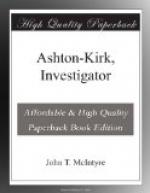There was discontent in Pendleton’s voice as he asked this question, and the investigator smiled as he made answer:
“That Hume knew the elder Morris supplies us with a theory as to the possible part which the younger Morris has taken in this drama. Whatever passed between Hume and the father has probably been taken up by the son.”
“Why, yes,” said Pendleton. “I hadn’t thought of that.”
“Another thing,” added Ashton-Kirk: “The report has swung like the needle of a compass, and indicated a fact that my imagination suggested days ago.”
“And that is—”
“That Hume once lived in the French town of Bayonne.”
Pendleton frowned impatiently.
“I don’t know what ever made you imagine that,” he said. “But now that you find that it is so, of what service is it?”
“We will speak of that later,” answered Ashton-Kirk.
Pendleton was about to say something more, but just then Fuller knocked and entered.
“The report on Allan Morris,” said he.
“Ah, thanks.” The investigator took the compactly typed sheets, and then he continued: “Tell Burgess that he need not bother about the man Locke whom he mentions. Say that I have already located him.”
“Very well,” and Fuller left the room.
For a space there was no sound save that which came from the street and the rustle of the pages as Ashton-Kirk went through them.
“Well,” asked Pendleton, finally. “What now?”
“Morris,” replied his friend, “does not develop like Hume. Fuller suspected that he’d prove colorless, and so it has turned out. However, I’ll read what he says. It’s headed:
“’A Second Report on Allan Morris
“’A very careful inquiry failed to uncover anything in connection with this young man’s personal affairs that was not mentioned in my first report on the same subject. He has led a very even, uneventful life, attending strictly to business and making every movement count in the direction of distinction as a marine engineer.
“’However, there has been something in his manner for the last few years that has attracted the attention of those who knew him best or came in contact with him. This took the various forms of eagerness of manner, irritability, long fits of reveries, a feverish desire for work. At his place of business I learned that he has for some time had a deep interest in the reports of the patent office. His clerks say that he’d read these for hours at a time; one of them told me of how he (the clerk) once forgot to call Morris’s attention to the report until the day after its arrival. Morris has always been very tolerant with his employees, but that day he burst out in a fury and threatened to discharge them all.
“’Richard Morris, father to Allan, was a most erratic genius, as my first report indicated. His propeller, his smoke-consumer, and his automatic brake were valuable commercial properties, but had all slipped from his control. Toward the end of his life he engaged in the perfection of an invention of which he talked a great deal and of which he declared that he alone would reap the benefit.




